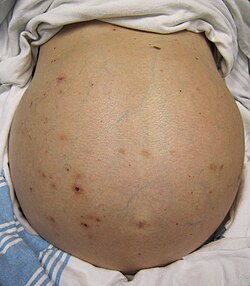Spontaneous Bacterial Peritonitis
Spontaneous Bacterial Peritonitis (SBP) is a complication, which occurs in patients who suffer from hepatal cirrhosis and ascites. At least 1/3 of cirrhotics go through this inflammation and aproximatelly 20% of them die, so we have to think about it in the differential diagnosis.
Etiology and Pathogenesis[edit | edit source]
Spontaneous means that there is no other reason of inflammation in abdominal cavity – e.g. rupture or perforation of an organ and no open wounds. Main originators are our own intestinal bacteria (Escherichia coli and Klebsiella pneumoniae).
The pathogenesis is highly influenced by hepatal insufficiency and portal hypertension. The structure of intestinal wall is weakened by a portal hypertension. It is more perfused and less selective, so bacteria pass into the blood stream much easier. What more, normal function of liver is also affected by cirrhosis, so blood can flow through the liver without any contact with Kupffer cells (part of the immune system). The last thing, that makes the formation of SBP easier is low antimicrobial defense of ascites.
Signs and Symptoms[edit | edit source]
- abdominal pain
- fever
- flatulence
- hepatic encephalopathy
- resistance to treatment of ascites
- abdominal tenderness
- signs of peritoneal irritation (not necessary)
- shock
- but about 10% is asymptomatic!
Diagnosis[edit | edit source]
The gold standard is abdominal puncture of ascites fluid. Normal ascites does not include any bacteria (or just a small amount of them), but if patient suffer from SBP then the sample is full of them and also the level of polymorphonuclear cells is very high. At the same time we have to send to cultivation also the blood culture of patient, because there is a risk of false-positive test results, if we contaminate the sample during puncture (e.g. contamination from the skin).
Therapy[edit | edit source]
It is absolutely necessary to start with the treatment as soon as we diagnose SBP, because it can be a condition that threatens life. We usually use some broad-spectrum antibiotics, which have to be used for very long time – at least for ten days, but prolonged use of drugs may prevent relapses, which are very common in this case. The best antibiotics are third-generation cephalosporins or chinolons. Aminoglycosides are not recommended, because of their bad effect on renal function.
Links[edit | edit source]
Related Articles[edit | edit source]
- Cirrhosis
- Ascites
- Portal Hypertension
- Hepatic Failure
- Hepatic Encephalopathy
- Signs of Peritoneal Irritation
- Broad-spectrum Antibiotics
Bibliography[edit | edit source]
- KLENER, Pavel, et al. Vnitřní lékařství. 4th edition. 2011. ISBN 978-80-7262-705-9.




